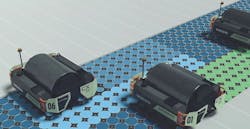Volvo Construction Equipment displayed another of its concept machines at The Utility Expo: the CX01 single-drum asphalt compactor.
Volvo designed the autonomous CX01 for multi-unit communication. It uses a single, split-drum vibratory drum kept upright by a self-balancing control system. Capable of being operated either by remote-control or entirely autonomously, the machine is also fitted with both a diesel engine and an energy storage system, making it a flexible electric hybrid solution. It can be operated in diesel-only, hybrid, or fully electric modes, according to Volvo.
“While the CX01 is a conceptual product, the research and development that have gone into it will benefit customers in other ways,” said Justin Zupanc, head of the asphalt compaction development team at Volvo CE, in a prepared statement. “It’s exciting for our engineers to push themselves to develop new and innovative ideas, and we’ve had personnel from the U.S. and Europe involved in the design, build and test phases of this concept.”
The CX01 concept improves the conditions for the operator and increases productivity, according to the company. The operator is removed from the unit—reducing exposure to vibration, noise, dust, and other associated environmental conditions—and freed up to autonomously control a fleet of CX units working together to compact asphalt surfaces.
Volvo suggests that a fleet of these units deployed on larger jobs could work together and communicate not only between each CX unit but also to other pieces of equipment on the site. The machines could survey the job site, report on the conditions of the mat—density, temperature, passes—and determine when and where to compact.
Use of the machines, according to Volvo, could streamline compaction cycles, reduce costs, and lead to more agile work patterns. Rolling pattern, weight, and number of rollers could be adjusted to match the width, thickness, and speed of paving operation.
The CX01 can be matched with Volvo’s existing Co-Pilot system so that all work can be handled remotely via a touchscreen interface. In addition, it uses GPS position tracking to monitor job performance and help customers better hit their productivity targets.
Volvo produced this walk-around video:





